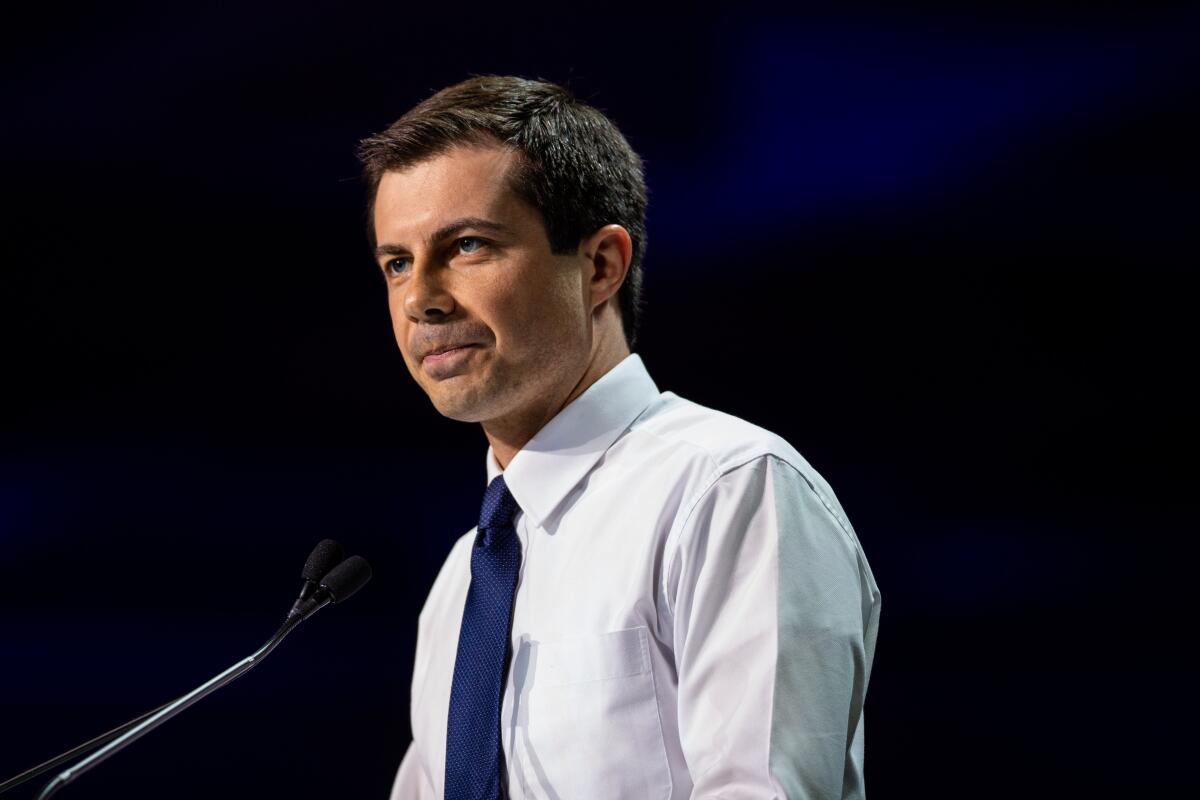Mayor Pete has the pedigree to clean up after Trump. But is that enough to win in 2020?

- Share via
A day will come when this long national migraine is over.
Or, if you like: A day will come when the national kidney stone that has brutally ravaged America’s psychic innards will have passed. Does that go too far?
In any case, at some point, President Trump will be gone.
We got this reminder in less physiological terms from Pete Buttigieg, the mayor of South Bend, Ind., and presidential candidate, at the Democratic debate Tuesday night.
Buttigieg, who was virtually unknown on the national stage until he announced his run for the presidency on April 14, has become famous for his academic and military bona fides. Having attended Harvard and then Oxford on a Rhodes scholarship, Buttigieg deployed to Afghanistan and served as an intelligence officer in the U.S. Navy Reserve. He’s also known as the enterprising if sometimes embattled second-term Democratic mayor of a mid-sized city in a red state.
But when on the debate stage Buttigieg showcased yet another side of himself: the McKinsey man.
That’s right: Buttigieg can put on feistiness when he has to, but he’s a gray-flannel, organization man at heart. After all, he spent his formative years after college at the Chicago branch of McKinsey & Co., the illustrious management consulting firm that’s probably more secretive than it needs to be since no one really knows what “management consulting” means. Here’s a flash tutorial: Management consultants help organizations make more money.
While at McKinsey, Buttigieg was trained in a brisk and unsentimental system of directing humans that, among other things, favors an “up or out” policy: If you don’t get promoted at McKinsey, you’re fired.
McKinsey folk are sometimes parodied as storm troopers who barge into companies and ax the lovable laggards. They’re also parodied as missionaries who think in lockstep and refer piously to the McKinsey Way.
But Buttigieg in his interviews and stump speeches aims to make a virtue of all his elite experiences, and that includes McKinsey. When he spoke on Tuesday of “the day after Trump,” his vision was briefly heartening and then stern. McKinsey pros see themselves as realists.
“It starts out feeling like a happy thought: this particular brand of chaos and corruption will be over,” Buttigieg first told the audience about post-Trump reality. “But really think about where we’ll be. Vulnerable. Even more torn apart by politics than we are right now. And these big issues — from the economy to climate change — have not taken a vacation during the impeachment process.”
According to “The McKinsey Mind,” a “business and leadership” guide published in 2018, the company’s methodology preaches that “you can’t have problem solving without a problem.” That means you don’t try to solve death or a rainstorm, which are facts of life. But America the day after Trump? Issue by issue, the problems can be analyzed and attacked.
At another moment in the debate, while arguing with Sen. Elizabeth Warren of Massachusetts, Buttigieg described his M.O. First he pointed out the “multi-trillion-dollar hole in this Medicare for all plan.” Then he moved to sell his solution: A less costly plan that would preserve private insurance companies (face facts, they aren’t going anywhere anyway) but still give people access to Medicare.
As the business-strategy guru Tom Peters once put it, “In McKinsey’s world, all of life is two things: strategy and organization.”
Buttigieg worked up to talking about his military experience but not in a treacly “Saving Private Ryan” way. Instead, he aimed to demonstrate how his time in Afghanistan qualified him to strategize all the more shrewdly than others about foreign policy and gun control.
Sure, this approach sometimes fails to deliver the dopamine blast debate watchers seem to live for. Others on the debate stage used the rhetoric of flat-out isolationism, for example — let’s get out of the Middle East entirely — but Buttigieg sees that as “embracing Donald Trump’s policy.” He’s an Israel supporter who seems to consider Saudi Arabia on probation as an ally. He also favors a continued intelligence presence in Afghanistan. And, he said, keeping our word with the Kurds shouldn’t be simplistically categorized as endless support of “endless war.”
Mayor Pete stands out in the Democratic crowd because the candidates are generally coached to try to inspire with yes-we-can-ism, not clear-eyed realism. On Tuesday, he also threw some punches.
When Trump returns to Trump Tower — or possibly settles into less opulent and, let’s say, locked digs — a new president, off the blocks, will have to address all the damage he’s done. To the Pax Americana and geopolitical stability. To ethics and fair play in public service. To the smooth running of all three branches of government. And most of all to the values and well-being of the American people.
The candidate who respects the profound problems we will inherit is likely to be the best next president. But the candidate who stacks up as especially prepped for problems, as we found in 2016, may lose for being too well-tuned for the job as opposed to the campaign. We’ll see if McKinsey has a model for that paradox.
Twitter: @page88
More to Read
A cure for the common opinion
Get thought-provoking perspectives with our weekly newsletter.
You may occasionally receive promotional content from the Los Angeles Times.









